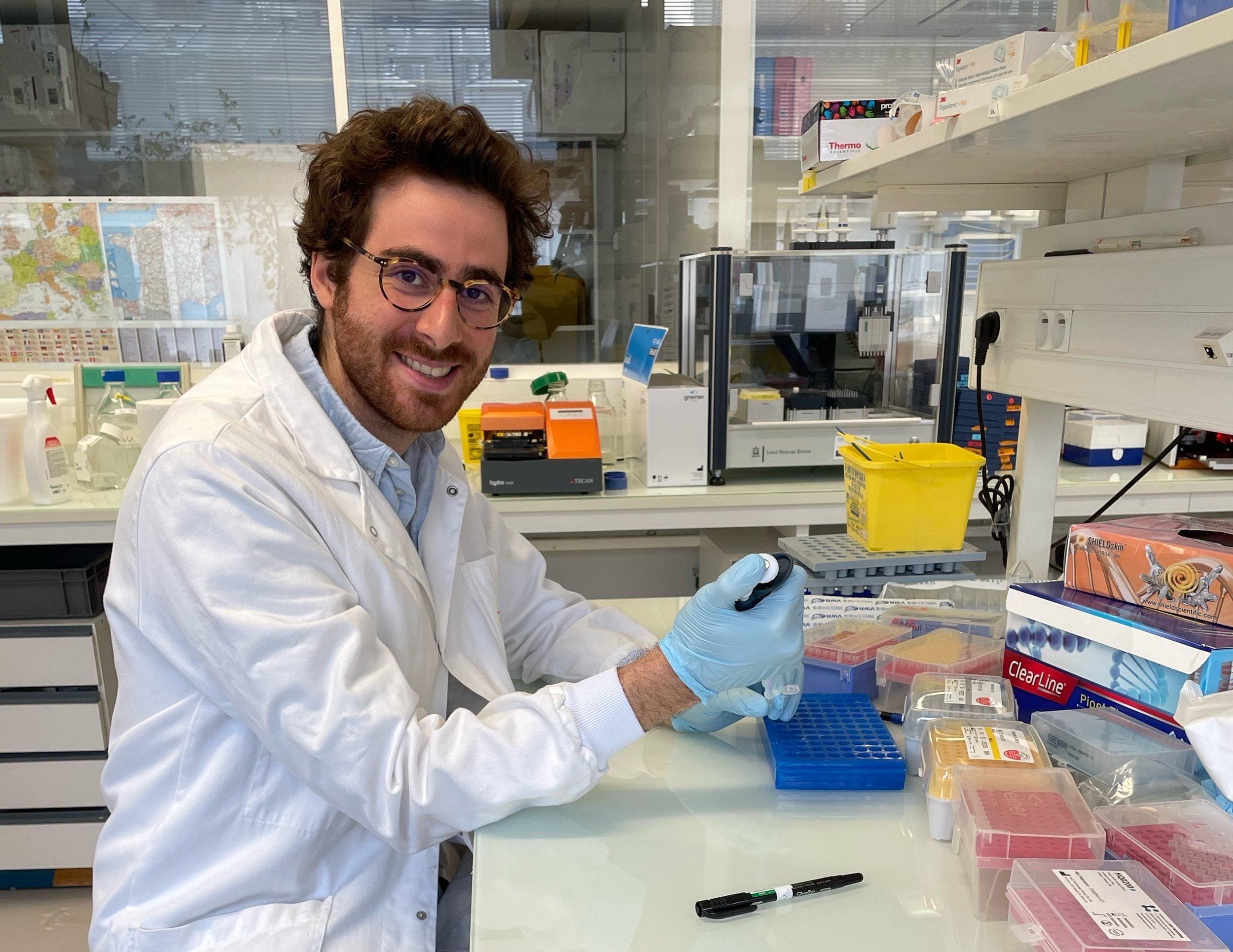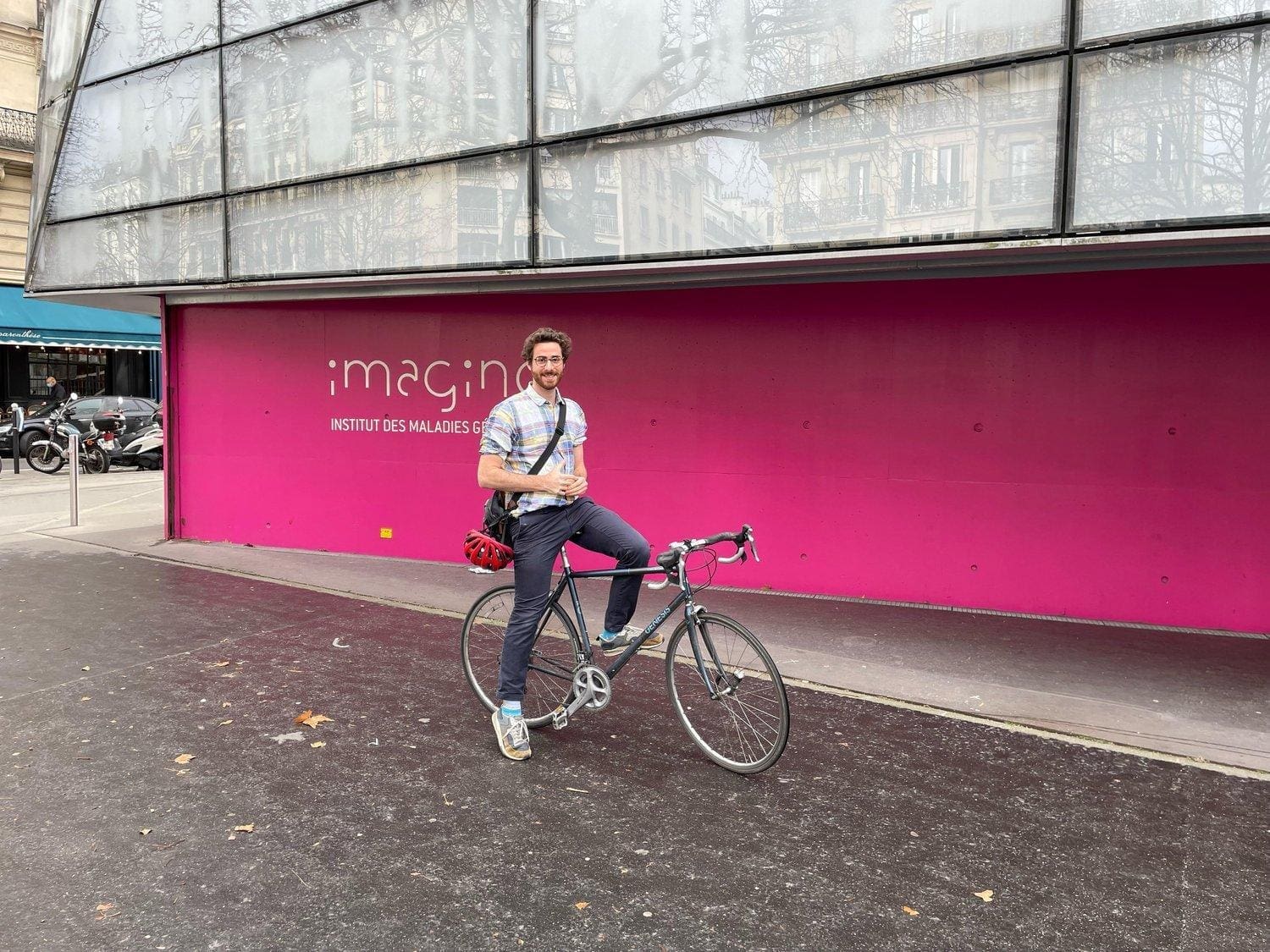Inaugural Recipient of the Michelson Philanthropies & Science Prize for Immunology Explores Disparity of COVID Severity.

Paul Bastard, Ph.D. was the 2021 Inaugural recipient of the Michelson Philanthropies & Science Prize for Immunology.
By Justin Chapman
As the COVID-19 pandemic enters its third year, so much is still unknown about the coronavirus that has killed more than 900,000 people in the United States and nearly 6 million people worldwide. But it affects everyone differently—some people experience no symptoms, while others lose their lives or experience severe disease.
Looking for answers, Dr. Paul Bastard, chief resident in the Necker Hospital for Sick Children’s Department of Pediatrics in Paris, created a consortium called the COVID Human Genetic Effort (CHGE) to recruit and test as many patients as possible with either severe disease or very mild disease and then to compare both genetic mutations.
“We’re trying to understand why some children or adults get a more severe infection than others,” he explained.
Dr. Bastard, who does his research in Jean-Laurent Casanova’s laboratory at the Imagine Institute in Paris, has set out to find answers by focusing on the genetic and immunological determinants of severe viral diseases, including the causes and consequences of autoantibodies against type I interferons.
On February 24, Michelson Philanthropies and AAAS/Science awarded Dr. Bastard with the inaugural Michelson Philanthropies & Science Prize for Immunology, a $30,000 grant for transformative research in human immunology with trans-disease applications to accelerate vaccine and immunotherapeutic discovery. Two other finalists, Dr. Scott Biering of UC Berkeley and Dr. Lisa Wagar of UC Irvine, each received $10,000 prizes.
“We’re trying to understand why some children or adults get a more severe infection than others.”
—Dr. Paul Bastard
Dr. Bastard’s essay for the prize looked at mutations in genes involved in the type I interferon (IFN) system (a potent antiviral defense), as well as autoantibodies (auto-Abs) that block these type I IFNs, and whether these mutations or auto-Abs make people more susceptible to COVID-related death.
“Let’s say two individuals—same age, same comorbidities—get infected with COVID. One might have very severe disease and most of the others actually won’t. The person who has severe disease might have a predisposition,” posited Dr. Bastard. “ Initially, I was working on a genetic predisposition to infectious diseases that are mostly found in children and young adults and affect the type I interferon pathway, which is a very potent antiviral defense system. I then found that some adults and especially elderly individuals had an autoimmune disease that blocked this immune response.”
The Mystery of Severe COVID
When the pandemic first began, no one knew why people had severe COVID. What everyone heard was that older people die at a higher rate from COVID, as well as people with diabetes or lung disease, but overall the risk factors weren’t well known.
“What our lab did in collaboration with more than 400 centers worldwide was to create a consortium called the COVID Human genetic effort (CHGE) to recruit and test as many patients as possible with either severe disease or very mild disease and then to compare both the genetic mutations that would affect genes important in the immune response and immunity overall,” he said.
He recalled riding his bike around the empty streets of Paris in the early weeks of the pandemic to collect blood samples from patients at hospitals.
“The city was completely empty, and all delivery services were shut down, so I was assigned a special authorization to collect these COVID-19 samples,” he said.

Dr. Paul Bastard recalled riding his bike around the empty streets of Paris in the early weeks of the pandemic to collect blood samples from patients at hospitals.
The team found that some relatively young patients had rare genetic deficiencies that were completely silent until COVID.
“I realized that perhaps there were other individuals that could have a more frequent cause of affecting the type I interferon pathway, which is a very important antiviral pathway,” he said. “It was known since the 1980s that these autoantibodies were present in some cases, but no one had actually looked if they could underlie severe disease. In 2020, we collected plasma from more than 900 individuals with severe COVID and tested them for the presence of autoantibodies blocking type I IFNs. I thought there were going to be a few individuals that would be positive. It turned out to be 10% of patients with severe COVID.”
Last year, they discovered it’s actually closer to 15% of individuals who are in the ICU for COVID who have these autoantibodies. Meanwhile, very few of the individuals who had very mild COVID were found to have these autoantibodies. The next step was to try to assess the prevalence of these autoantibodies in the general population and see if it increases with age in the uninfected.
Antibodies and the Elderly
Thanks to many collaborators, they collected samples from pre-COVID-19 and tested 34,000 samples of healthy individuals, and found that before ages 65-70, the presence of autoantibodies were rare, about 0.2 or 0.3% of the uninfected population. After 70, though, there was a sharp increase and it reached more than 4% of elderly patients who had these autoantibodies. Dr. Bastard posits that this potentially explains why elderly patients experience more severe COVID, because the prevalence of these autoantibodies increases with age.
“What is striking is that I was working on a patient who had IFNAR1 deficiency, the deficiency in the receptor to type I interferons, and then we found patients in our cohort of severe COVID patients who had the same deficiency in IFNAR1, so the switch was easy and logical,” he said. “It was the same genetic, viral disease as was herpes encephalitis. Autoantibodies was a completely new subject for me. I’m a pediatrician, and I ended up working on elderly patients. I almost became a geriatrician. It was completely different.”
“This is definitely the kind of project that, before COVID and before finding these results, would have a very hard time getting funding. We’re still having a hard time convincing some people of the reality of this.”
—Dr. Paul Bastard
Dr. Bastard is a pediatrician who attended medical school in Paris and completed residencies in Paris and Madrid. He received his master’s from Rockefeller University and then went back to a residency focusing on pediatric immunology. He completed his Ph.D. in Paris in October. His initial Ph.D. subject was the genetic predisposition to herpes encephalitis, which is a brain viral infection.
Dr. Bastard said these findings have yet to be widely translated into clinical practice.
“The subject of autoantibodies to type I IFNs, which was completely bold and new and unexpected, had not gotten much attention in the last 40 years,” he said. “Since their discovery in the 1980s, few teams in the world have worked on them. We were one of them. When we started showing our data to colleagues, some people wouldn’t believe us. This is definitely the kind of project that, before COVID and before finding these results, would have a very hard time getting funding. We’re still having a hard time convincing some people of the reality of this.”
A Prize for Pursuing Ideas
He added that he hopes winning the Michelson Prize will bring recognition to his work and to the field.
“Putting a name like this prize on our work is huge,” he said. “I hope it’s going to raise awareness, because some still do not believe that people can suffer from a severe infectious disease because of a pre-existing immune deficiency. We’re trying to have hospitals test for these autoantibodies, because it’s very easy. That is starting, but it hasn’t reached the general community yet. So I hope that the more recognition we get, the more our findings and basic research will get to the patients.”
Dr. Bastard also offered advice for future researchers who are considering applying for the prize.
“If you have an idea, pursue it,” he said. “There could have been many moments since my initial idea in 2020 where things could have stopped either because of experimental problems or because we thought it wasn’t interesting enough. I must acknowledge all the support from Jean-Laurent Casanova and from all of our team. Ideas might not always work out, but believing in them and testing them experimentally, from the hypothesis you make, is the best way to go all the way through writing a prize application.”
Learn more about the Michelson Philanthropies & Science Prize for Immunology here.
